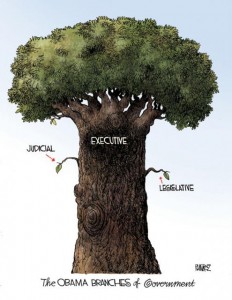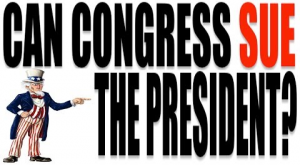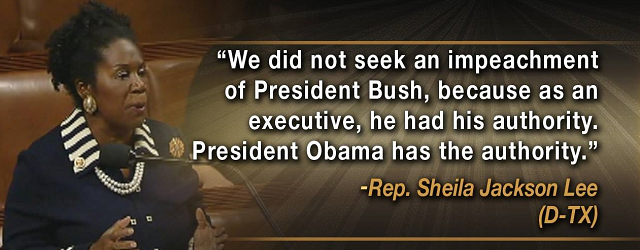Editor’s Note – Of late, the ‘I-word’ has been thrown about liberally in relation to not only Obama, but also in relation to some of his cabinet, including AG Eric Holder. Great legal and political minds correctly determined that today, impeachment is a political solution to a legal problem. They are thinkers, not emotional, ideological reactionaries.
Additionally, it is likely impossible to proceed through to a successful conviction in the Senate due to politics anyway. But that does not leave much room left to alleviate a certain problem, an epic problem, – over-reach by the Executive Branch, usurping the power of the Legislative Branch.
There is a grave legal issue before us, a constitutional issue at crisis level and it is therefore up to the third branch to decide the issue between the other two branches, the Judiciary. Thomas Sowell asks, “has thinking become obsolete?” It has when politicians rely on people being ill-informed. It is time for thinkers, time to become informed.
The House therefore decided to bring suit, and passed a resolution to do so along party lines. This invites political grand-standing, but the question is why the left cheered when Obama spoke about his ‘pen and phone’ in his last State of the Union speech.
Why would sitting Congressman cheer about losing their own power, diluting their ability to represent their constituents of all stripes in their districts?
Therefore a ploy has been launched by the President’s supporters, the Democrat Party, and the White House itself to muddy the waters with talk of impeachment, to confuse America and diminish the real problem. “Sue me,” is the other childish retort to gin up his base, but there are very real reasons to sue, in a focused and detailed adult fashion.
It is time to think, not time to make more “Kool-Aid.” Time to think, just ask Rep. Sheila Jackson Lee R-TX, about impeachment and thinking. Some think and beat the drum that this is a frivolous lawsuit, we counter that it is time think, not run smear campaigns.
The left also loves to trot out the volume of Executive Orders each previous President has signed, but it has nothing to do with quantity. Rather, it is what the individual order covered, and what action each entailed. With this President, it is all about the details, which he always strives to keep hidden. Effectively, Obama has created a fourth branch – the “Pen and Phone” branch.
In order to help you understand what Speaker Bohner and the House are actually doing, we are posting two articles that we recommend you read thoroughly. The first is a question and answer session on the suit the House is bringing, and the second is a ten-point lesson on the details of the over reach:
Q&A: Ten Things You Need to Know About Boehner Suing Obama
By Elizabeth Slattery – Daily Signal
Last week, the House of Representatives voted to authorize Speaker John Boehner to file a lawsuit challenging President Obama’s failure to fully implement Obamacare. Specifically, the lawsuit will challenge the administration’s delay of the employer mandate—requiring many employers to provide health insurance or pay a fine—that was supposed to go into effect Jan. 1. It’s clear President Obama repeatedly has abused executive power to circumvent Congress and essentially rewrite the law, but this lawsuit still raises a host of questions.
Q1: Can you sue the president?
Yes. Presidents enjoy immunity from lawsuits for civil damages resulting from their official acts, but they are not immune from all lawsuits. For example, the Supreme Court allowed Paula Jones’ suit for sexual harassment against President Clinton to proceed while he was in office. Further, members of Congress have filed dozens of lawsuits against presidents over the years. Most have been unsuccessful, usually because members fail to allege a sufficient injury. Since Boehner’s lawsuit will deal with implementing Obamacare, the suit likely will be brought against Secretary of Health and Human Services Sylvia Burwell and other executive branch officials charged with carrying out the law. It’s possible Obama won’t actually be named in the lawsuit.
Q2: Who will represent the House in court?
The House’s Office of General Counsel routinely represents the House in legal disputes, such as suits to enforce congressional subpoenas or the Speech and Debate Clause. In the past, the House also has hired outside counsel, such as when the House Bipartisan Legal Advisory Committee hired former Solicitor General Paul Clement to handle the Defense of Marriage Act litigation.
Q3: How will this lawsuit be funded?
As with past lawsuits, the House will appropriate funds to pay for the litigation. The Committee on House Administration will make public quarterly statements in the Congressional Record detailing expenses.
Q4: Does the Senate have a role?
The Senate probably is not required to join in the lawsuit. Under the Supreme Court’s precedents, members of Congress have standing to assert personal injuries or direct and concrete institutional injuries. In Coleman v. Miller (1939), the Supreme Court found a group of state senators demonstrated a sufficient institutional injury even though the suit was brought by 26 members of one chamber.
Q5: Why would the House sue when it has other remedies?
Boehner has determined filing a lawsuit will be the most effective way to rein in the executive branch. Other remedies do exist—mainly appropriations and impeachment—but they require the Senate’s involvement. The House could try to leverage appropriations to encourage the president to faithfully execute the law, but as Boehner has pointed out, the Democratic Senate could refuse to pass such an appropriations bill. Similarly, impeachment requires conviction by two-thirds of the Senate. Although Boehner’s lawsuit may face obstacles, it would not require Senate concurrence.
Q6: What happens if Obama loses?
Courts routinely enforce statutory mandates, such as the express deadlines in Obamacare that the executive branch has “relaxed.” Concerns the president would ignore the courts likely are unfounded. Even though Obama has complained about his losses, “There is no case in which he completely refused to follow a Supreme Court ruling he lost,” said Todd Gaziano, executive director of the Pacific Legal Foundation’s Washington, D.C., center.
Q7: What happens if Boehner loses?
Before a court considers the merits of Boehner’s lawsuit, it first must decide whether the House has standing to bring this suit. If a court determines Boehner failed to establish Article III standing (a constitutional requirement for all lawsuits), it would result in dismissal of the case, but it would not mean the court agrees the president acted properly. If the suit is dismissed, it’s possible a private party may file suit, although the lack of private parties is one reason Boehner says his lawsuit is necessary. After members of Congress failed in their challenge to the Line Item Veto Act in Raines v. Byrd in 1997, the Supreme Court struck down the law when the City of New York and a group of private parties challenged it the next year.
Q8: Didn’t Bush issue more executive orders than Obama?
Yes, but that is irrelevant to Boehner’s lawsuit. Executive orders are directives issued by the president to run the various parts of the executive branch—ranging from George Washington’s proclamation calling on the militia to put down the Whiskey Rebellion to Harry Truman’s order desegregating the armed forces. Most executive orders throughout our nation’s history are perfectly appropriate and non-controversial. Boehner’s lawsuit does not address Obama’s use of executive orders per se. Instead, the suit will challenge his failure to faithfully execute the law. The American Presidency Project, which has cataloged every executive order, says Bush issued 291 executive orders, Obama has issued 183 to date, and Franklin D. Roosevelt issued the most with more than 3,500.
Q9: Will this open the floodgates for Congress and the Executive Branch to turn to the courts to resolve their disputes?
No. There have been plenty of lawsuits brought by members of Congress against presidents and other executive branch officials in the past. The Supreme Court has been pretty clear that courts should not entertain “sore loser” suits where members of Congress sue over a vote they lost. This suit will not change the judiciary’s reluctance to get involved in political disputes between the other branches of government.
Q10: Now that the House has authorized the suit, what happens next?
The Wall Street Journal reports the House “isn’t expected to bring the suit for at least another month.” The House Office of General Counsel and any outside lawyers that will be involved in the case likely are deciding which court would be most advantageous and drafting the complaint which will lay out specific allegations as well as the relief the House will seek in its lawsuit.
Peter Bigelow contributed to preparing this Q&A.
President Obama’s Top 10 Constitutional Violations Of 2013
By Ilya Shapiro – Forbes
One of Barack Obama’s chief accomplishments has been to return the Constitution to a central place in our public discourse.
Unfortunately, the president fomented this upswing in civic interest not by talking up the constitutional aspects of his policy agenda, but by blatantly violating the strictures of our founding document. And he’s been most frustrated with the separation of powers, which doesn’t allow him to “fundamentally transform” the country without congressional acquiescence.
But that hasn’t stopped him. In its first term, the Administration launched a “We Can’t Wait” initiative, with senior aide Dan Pfeiffer explaining that “when Congress won’t act, this president will.” And earlier this year, President Obama said in announcing his new economic plans that “I will not allow gridlock, or inaction, or willful indifference to get in our way.”
And so, as we reach the end of another year of political strife that’s fundamentally based on clashing views on the role of government in society, I thought I’d update a list I made two years ago and hereby present President Obama’s top 10 constitutional violations of 2013.
1. Delay of Obamacare’s out-of-pocket caps. The Labor Department announced in February that it was delaying for a year the part of the healthcare law that limits how much people have to spend on their own insurance. This may have been sensible—insurers and employers need time to comply with rapidly changing regulations—but changing the law requires actual legislation.
2. Delay of Obamacare’s employer mandate. The administration announced via blogpost on the eve of the July 4 holiday that it was delaying the requirement that employers of at least 50 people provide complying insurance or pay a fine. This time it did cite statutory authority, but the cited provisions allow the delay of certain reporting requirements, not of the mandate itself.
4. Exemption of Congress from Obamacare. A little-known part of Obamacare requires Congressmen and their staff to get insurance through the new healthcare exchanges, rather than a taxpayer-funded program. In the quiet of August, President Obama directed the Office of Personnel Management to interpret the law to maintain the generous congressional benefits.
5. Expansion of the employer mandate penalty through IRS regulation.Obamacare grants tax credits to people whose employers don’t provide coverage if they buy a plan “through an Exchange established by the State”—and then fines employers for each employee receiving such a subsidy. No tax credits are authorized for residents of states where the exchanges are established by the federal government, as an incentive for states to create exchanges themselves. Because so few (16) states did, however, the IRS issued a rule ignoring that plain text and allowed subsidies (and commensurate fines) for plans coming from “a State Exchange, regional Exchange, subsidiary Exchange, and federally-facilitated Exchange.”
6. Political profiling by the IRS. After seeing a rise in the number of applications for tax-exempt status, the IRS in 2010 compiled a “be on the lookout” (“BOLO”) list to identify organizations engaged in political activities. The list included words such as “Tea Party,” “Patriots,” and “Israel”; subjects such as government spending, debt, or taxes; and activities such as criticizing the government, educating about the Constitution, or challenging Obamacare. The targeting continued through May of this year.
7. Outlandish Supreme Court arguments. Between January 2012 and June 2013, the Supreme Court unanimously rejected the Justice Department’s extreme positions 9 times. The cases ranged from criminal procedure to property rights, religious liberty to immigration, securities regulation to tax law. They had nothing in common other than the government’s view that federal power is virtually unlimited. As a comparison, in the entire Bush and Clinton presidencies, the government suffered 15 and 23 unanimous rulings, respectively.
9. Assault on free speech and due process on college campuses. Responding to complaints about the University of Montana’s handling of sexual assault claims, the Department ofEducation’s Office of Civil Rights, in conjunction with the Justice Department, sent the university a letter intended as a national “blueprint” for tackling sexual harassment. The letter urges a crackdown on “unwelcome” speech and requires complaints to be heard in quasi-judicial procedures that deny legal representation, encourage punishment before trial, and convict based on a mere “more likely than not” standard.
10. Mini-DREAM Act. Congress has shamelessly failed to pass any sort of immigration reform, including for the most sympathetic victims of the current non-system, young people who were brought into the country illegally as children. Nonetheless, President Obama, contradicting his own previous statements claiming to lack authority, directed the Department of Homeland Security to issue work and residence permits to the so-called Dreamers. The executive branch undoubtedly has discretion regarding enforcement priorities, but granting de facto green cards goes beyond a decision to defer deportation in certain cases.
It was hard to limit myself to 10 items, of course—Obamacare alone could’ve filled many such lists—but these, in my judgment, represent the chief executive’s biggest dereliction this year of his duty to “preserve, protect, and defend” the Constitution, and to “take care that the law be faithfully executed.”
Alas, things may get worse before they get better. New presidential “counselor” John Podesta’s belief in governance by fiat is no secret; in a 2010 report, he wrote that focusing on executive power “presents a real opportunity for the Obama administration to turn its focus away from a divided Congress and the unappetizing process of making legislative sausage.”
Happy New Year!
Ilya Shapiro is a senior fellow in constitutional studies at the Cato Institute and editor-in-chief of the Cato Supreme Court Review.




